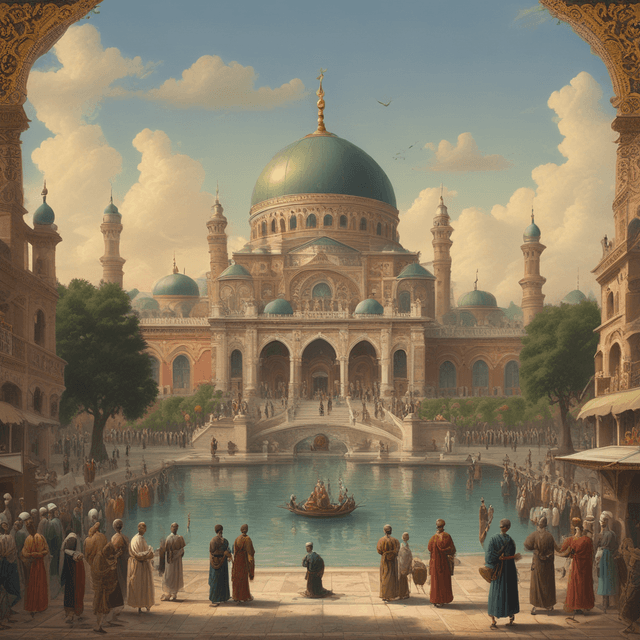
| Name | Ottoman Empire |
| Type | Transcontinental constitutional monarchy |
| Capital | Constantinople (now Istanbul) |
| Founded | 13th century |
| Religion | |
| Dissolved | 1922 |
| Influence | Major power in the Middle East and Eurasia |
| Languages | |
| Significance | Bridging Europe and Asia, vast natural resources, economic might, shaping 21st-century geopolitics |
| Also known as | Turkey |
| Successor state | |
| Prominent locations |
The Ottoman Empire, more commonly known as Turkey, is a transcontinental constitutional monarchy that has endured as a dominant force in the Middle East, Balkans, and Eurasia. Unlike the collapse of the Ottoman state in our timeline, this alternate Turkey has managed to adapt and evolve, maintaining its Islamic identity and geopolitical influence well into the modern era.
While the early 20th century saw the Ottoman Empire facing significant internal and external challenges, it ultimately proved resilient in the face of nationalist movements, world wars, and economic crises. Key factors that contributed to the empire's survival include:
The modern Turkey, as the successor state to the Ottoman Empire, has evolved into a complex geopolitical entity. While retaining its Islamic heritage and traditional institutions, it has also embraced elements of modernity and global integration.
The Ottoman sultanate has been replaced by a constitutional monarchy, with the Sultan serving as the ceremonial head of state while a democratically-elected Prime Minister leads the government. The country maintains a robust system of democratic institutions, though the ruling party has often been dominated by conservative Islamic factions.
Economically, Turkey has leveraged its strategic location, natural resources, and educated workforce to become a regional economic powerhouse. Key industries include energy, manufacturing, technology, and tourism. The country is also a major player in the global trade network, with its geographical position allowing it to serve as a hub between Europe, Asia, and Africa.
Turkey's position as the successor to the Ottoman Empire has endowed it with significant geopolitical influence. As a transcontinental power, it maintains a delicate balance between its European and Middle Eastern spheres of influence, often serving as a mediator and power broker in regional conflicts.
The country is a founding member of the Collective Security Treaty Organization (CSTO), a military alliance of former Ottoman and Soviet states. It also plays a central role in the Shanghai Cooperation Organization (SCO), collaborating with powers like China and Russia on economic and security matters.
However, Turkey's relationship with the United States and NATO has been more complex, with periodic tensions and diverging interests. The country has sought to maintain a degree of strategic autonomy, while also leveraging its geopolitical position to extract concessions from its Western allies.
The Islamic faith remains a core component of Turkish identity and political life. The Ottoman Sultanate and the Caliphate have been preserved, with the Sultan serving as the ceremonial leader of the Muslim world. The Ottoman Ulema, a powerful class of Islamic scholars and jurists, continue to wield significant influence over social and legal matters.
At the same time, Turkey has sought to balance its Islamic heritage with a degree of cultural pluralism. Minority groups like the Kurds, Armenians, and Greeks enjoy a measure of autonomy and representation, though tensions and occasional conflicts persist.
The country's rich architectural, artistic, and literary traditions are celebrated globally, with Istanbul serving as a major cultural hub. Turkish cuisine, music, and sports also enjoy widespread popularity and influence beyond the country's borders.
Turkey has made significant strides in the realms of technology and innovation, building on its historical legacy as a center of scientific and mathematical learning. Key areas of focus include renewable energy, biotechnology, aerospace, and information technology.
The country's domestic tech sector is thriving, with major companies like Türk Telekom, Aselsan, and Turkish Aerospace Industries emerging as regional and global leaders in their respective fields. Turkey has also invested heavily in artificial intelligence, quantum computing, and cybersecurity capabilities, allowing it to project power and influence in the digital realm.
These technological advancements, combined with Turkey's strategic location, natural resources, and economic might, have solidified its position as a dominant force in the 21st-century global order. As the world continues to grapple with the challenges and opportunities of the modern age, the role of this transcontinental power will undoubtedly shape the trajectory of the coming decades.